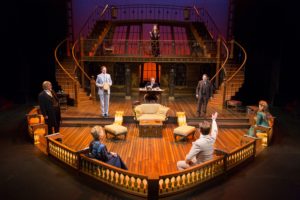In the online edition of today’s Wall Street Journal, I review Hartford Stage’s production of Heartbreak House. Here’s an excerpt.
* * *
What makes a play classic? One possible benchmark is that of permanent relevance: It portrays its own time in a way that illuminates ours. You’ll be hard-pressed to find a better example of that kind of classicism than “Heartbreak House,” in which George Bernard Shaw, writing in 1919, cast a cold eye on his own class, the educated liberals of Vicwardian England, and came to the damning conclusion that World War I had revealed them to be morally bankrupt. “Heartbreak House” was insufficiently appreciated in Shaw’s own time and for long afterward, in part because of its length (the first performance ran for four hours). But now that the script has entered the public domain, meaning that it can be performed in abridged versions, “Heartbreak House” has become one of Shaw’s most frequently produced plays, especially in this country. Now it’s come to Hartford Stage in a version staged by Darko Tresnjak, the company’s artistic director, that is not without flaw—more about that later—but nonetheless brings an elusive play to life in a way that is lively and immediately accessible….
 The setting, a country house that looks like “an old-fashioned high-pooped ship,” is the home of Captain Shotover (Miles Anderson), an octogenarian seaman whose bristling energy cannot conceal the fact that he’s losing his wits. He has two daughters—one a frivolously sexy bohemian (Charlotte Parry), the other a high-society prig (Tessa Auberjonois)—who between them embody all that Shaw thought wrong with the English national character.
The setting, a country house that looks like “an old-fashioned high-pooped ship,” is the home of Captain Shotover (Miles Anderson), an octogenarian seaman whose bristling energy cannot conceal the fact that he’s losing his wits. He has two daughters—one a frivolously sexy bohemian (Charlotte Parry), the other a high-society prig (Tessa Auberjonois)—who between them embody all that Shaw thought wrong with the English national character.
This being a country-house comedy, the Shotover house is full of guests, nearly all of whom are, as one of them says, “most advanced, unprejudiced, frank, humane, unconventional, democratic, free-thinking, and everything that is delightful to thoughtful people.” The capitalist in the woodpile is Boss Mangan (Andrew Long), a bloated, parasitical businessman. He is, of course, doomed—but so, too, are the other delightful but ineffectual occupants of Heartbreak House, who lack the will to reconstruct their corrupt society along properly Shavian lines….
The younger Shaw might well have written “Heartbreak House” as a didactic comedy with a hopeful ending. By 1919, though, World War I had blown the progressive optimism out of him, leaving nothing but the frustrated will to power that would lead him to embrace Soviet Communism in his senescence. Before that, though, he wove his despair into a tragicomedy that works as theater precisely because it offers no neat solution, only the enraged poetry of a great artist.
Understanding this, Mr. Tresnjak, who has a near-miraculous knack for staging “well-made” plays, has given us a “Heartbreak House” that is bright in tone and light on its feet, thereby allowing you to take the point by yourself….
* * *
Read the whole thing here.
A trailer of scenes from Heartbreak House:


